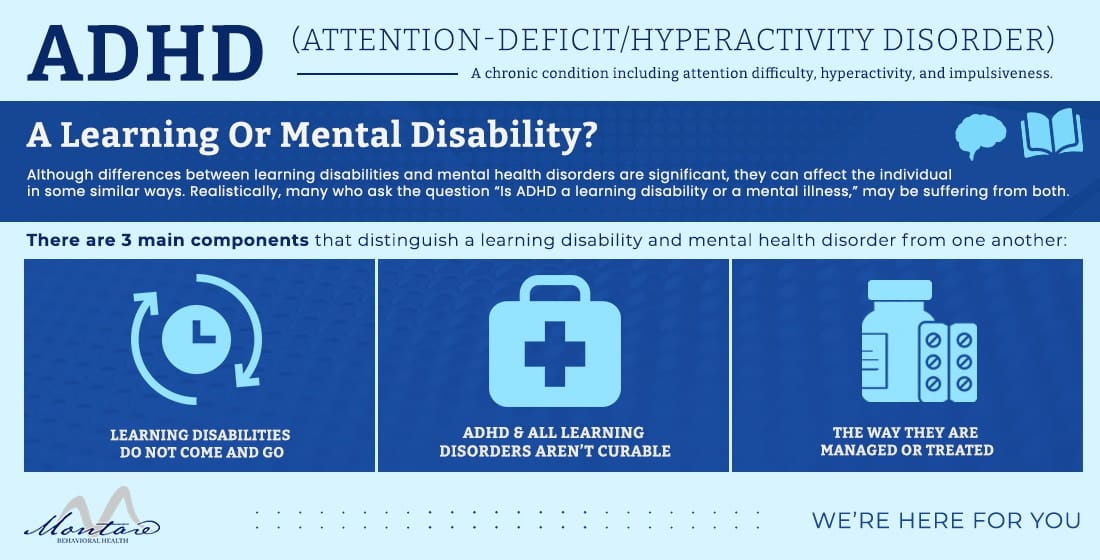One common misconception about learning disabilities and mental health illnesses is that they are the same. Many even attempt to use the words interchangeably when discussing ADHD. While a learning disability and a mental health disorder can influence the other, they’re not mutually exclusive.
As for ADHD, it is defined and managed as a learning disability, based on meeting the criteria. To understand why ADHD is a learning disability, it is important to first be able to define what it entails.
What Is ADHD?
ADHD, or Attention-Deficit/Hyperactivity Disorder, is recognized by difficulty concentrating, being distracted easily, and inability to steadily remain on task. Children with ADHD, often have difficulty with attention to detail, organizational skills, or following instructions. They may also have difficulty participating in conversation, often becoming distracted.
Children that are diagnosed with the hyperactivity variety of the illness, exhibit symptoms most often noticed as nonstop motion. Occasionally mistaken for rebellion or disobedience, a combination of medication and individual therapy is usually necessary.
In adults, ADHD can be particularly tricky to diagnose, based on the similarities of symptoms with mental illnesses. Being undiagnosed and not properly treated for so long, comes with its own set of complications. Many often question whether ADHD is a learning disability or a mental illness, especially those diagnosed later in life.
ADHD Symptoms Used For Diagnosis
Differentiating between ADHD and other disorders requires the examination of symptoms and how each affects the individual’s life. ADHD associated disorders are often observable, and display some of the following behaviors:
- The noticeably short duration of attention span
- Unwillingness to dedicate attention when necessary, especially if unamused
- Verbally, physically, or emotionally hyperactive with the inability to exert self-control
- Behaving impulsive, in adults, is often seen as rebellious or reckless
- Unable to remain still, usually by displaying restlessness and fidgeting
- Lack of priority, being unprepared or disorganized
- Often late, or with no regard for time, or time management
- Difficulty managing moods or regulating emotions
- Easily becoming frustrated, or even angry, even when the trigger is not obvious
- Memory problems or cognitive separation from obligations
- Displaying a lack of responsibility and procrastination
- Unable to multitask or separate two separate events physically or emotionally
- Unreasonably distracted or being unable to pay attention
- Trouble understanding proper order of operations, such as waiting for one’s turn and sharing
The difficulty diagnosing learning disorders and mental illness comes from the similarities often seen between them. Yet, ADHD often refers to a difference in how the brain receives and processes information. Or even, how it uses the information to make decisions.
Treating ADHD: Learning Disability Vs Mental Illness
Although numerous studies have been conducted on what makes the ADHD brain different, there are many inconsistencies. It’s individuality that often makes this tricky. ADHD symptoms can range significantly from gender to age and are often different in boys than in girls. On top of that, it may take more than medication to work through the behavioral side of ADHD. That is if medication is even an option for the individual.
Getting care from a professional mental health care facility is always going to be the best option. Furthermore, ADHD testing and screening use multiple methods and sessions to rule out the possibility of mental illness.
Inpatient treatment centers offer a well-rounded means of diagnosing methods to place priority on the needs of each individual. While in the safety of the residential program, individuals of any age can receive one on one evaluation with a specialist. Not only is it the safest way to approach treatment, but underlying mental health disorders can also be focused upon.
Understanding What It’s Like To Live With ADHD
Take a minute to think about what you are going to have for breakfast tomorrow. Seems like a silly thing to put so much thought into in advance. But for an individual that is suffering from ADHD, it may be a major distraction. Imagine you are at work, trying to get finished for the rest of the day, and your mind begins to drift. Suddenly, you think about what you are going to eat for breakfast… tomorrow.
For most people, it would be an easy decision, think about it and be done. But for an individual that suffers from a learning disability like ADHD, these distracting thoughts continue to poke through. Now, combine that with hearing the traffic outside your office window. Then, add in the conversation your coworker is having down the hallway. But remember, all you need to do is get finished with your work. Here’s an example:
But, what about that breakfast? Do you have to go to the store to get the ingredients you’ll need? (Sirens wailing.) Will the store be open? (Honking horns.) Gotta get this work done, focus! Look at this chipped nail. Will they have what you are looking for in the market? “Saturday brunch sounds great! I’ll see if my…” (A train is passing.) *Email notification* Will you have enough time to make it and eat? I wonder if they know that the light bulb is out. Oh right, back to work. (birds chirping) “That’s great, I’ll pick you up at noon, and then we can…” *Sound of the printer* Eggs or pancakes?
Sound overwhelming? That’s because it is.
Most of us can block out the distraction and pay attention to completing the assignment. The proper redirection of attention is what sets those with a learning disability apart.
It is noisy and fast-paced and completely overloads the senses. Not only are ADHD sufferers experiencing an awareness of multiple thoughts and stimuli, but it’s difficult to determine which are immediately useful. Imagine a child being told to stay on task when all of their senses are distracted by everything else. Now, imagine that it is constant. It’s because of this that getting a proper diagnosis is critical to restoring quality of life.
The Differences Between A Disability and Mental Health
ADHD can be a very distressing illness. Much like a mental illness, it can bring about unwanted feelings and affect the cognitive function of the individual. While learning disabilities and mental illnesses do have many more things in common than differences, specific criteria set them apart. Three main components distinguish a learning disability and mental health disorder from each other.
- The first is the onset. An individual with ADHD associated disorders will have had ADHD all of their lives and will continue to. Learning disabilities do not come and go. People are either born with them, or develop into having them, or are genetically predisposed. ADHD is not transient, meaning it does not come and go. That said, it is possible to be diagnosed as an adult. Sometimes as children and adolescents, we are better able to cope until becoming fully independent adults.
- The second factor that sets apart disability and mental health inquiries, is that ADHD, and all learning disorders, aren’t curable. Learning disabilities are the miscommunication of the messages sent out and received by pathways of the brain. The individual will be impacted by their illness throughout the entirety of their lives. That said, some can be successfully managed with medication and cognitive-behavioral therapy.
- The third distinguishing element is the way they are managed or treated. Because mental health disorders are the products of neurochemical imbalances, medications and coping behaviors are the first options. More often than not, mental health disorders can have a significant improvement or even complete dissipation after treatment. However, ADHD requires ongoing attention and management of medication-taking constant action to correct.
Although differences between learning disabilities and mental health disorders are significant, they can affect the individual in some similar ways. Realistically, many who ask the question “Is ADHD a learning disability or a mental illness,” may be suffering from both.
When a Mental Illness and Learning Disability Occur Together
Having a disability or a mental health disorder are two very different diagnoses. Yet, they are much more likely to occur together. As many as 25% of individuals with a learning disorder, such as ADHD, will suffer from a psychological illness. In a majority of these cases, a learning disability may have contributed to the onset of the psychological illness.
Depression is most commonly diagnosed in combination with a learning disability. Sometimes the frustration that coincides with managing ADHD can bring upon overwhelming feelings of hopelessness. In these cases, getting mental and behavioral health care could restore the quality of life for the suffering individual.
Learning Disabilities Can Lead to Mental Illness, But Not Vice Versa
It is important to note that mental illnesses are not known to cause learning disabilities. They remain two separate entities, and psychological pathways do not lead to learning disabilities. This is proven despite the opposite occurring more than likely.
Essentially, it is a one-way street. Still, the onset of psychological illness, such as anxiety, depression, or bipolar disorder can be triggered by underlying illnesses. The frustration or trauma experienced by individuals that suffer from ADHD links onset to having a learning disability.
Conditions That Can Occur Along With ADHD
When it comes to children, ADHD and associated disorders are often screened for together. The presentation of coexisting illnesses that require separate methods of treatment to discover any underlying conditions that could be exacerbating the main issues at hand. Some of the most common that apply to youth, as far as ADHD and other disorders, include:
Additional Learning Disorders
Many times, more than one learning disorder is diagnosed with another. For example, a child that suffers from ADHD may also suffer from auditory processing disorder, autism, or even dyslexia. Not only is screening for additional learning disabilities beneficial to the child, but ruling them out to focus elsewhere also.
Conduct Disorders
Also known as oppositional defiant disorders, these illnesses present themselves through hostility and aggression. Although this behavior is often intentional, a pattern of behavior is a diagnosable illness with ADHD.
Like children, adults that suffer from ADHD may also be dealing with multiple disorders. Some disability and mental health conditions that are most likely to be dually diagnosed with ADHD include:
Mood Disorders
Some of the most common mood disorders diagnosed are depression and bipolar with a learning disorder. Among ADHD sufferers, almost 20% are dually diagnosed and require medication and treatment.
Anxiety
More than 25% of individuals diagnosed with ADHD experience episodes and panic attacks co-occurring. Because of the rapid fluctuation of distracting thoughts, anxiety is common. Additionally, anxiety and obsessive-compulsive disorders are prevalent among adults who were never diagnosed as children but still suffered.
ADHD Is A Learning Disability Not a Mental Illness
Although ADHD isn’t considered a mental illness, taking measures to evaluate for both is a step in the right direction. A mental health disorder almost always alters the mood, sense of wellbeing, or perception of reality of the sufferer. That said, in its way, so does a learning disability.
While they are not the same, enduring life with one or more untreated illnesses can cause extreme distress. If you or someone you know needs help to manage ADHD or other disorders, suggest getting them professional care.
Getting the proper diagnosis and treatment makes a world of difference. Don’t let the opportunity slip by to better your quality of life. Help is here. Contact us today for more information.
References:
https://www.additudemag.com/adhd-symptoms-checklist/
https://www.hopkinsmedicine.org/health/conditions-and-diseases/adhdadd
https://www.additudemag.com/neuroscience-of-adhd-brain/
https://www.news-medical.net/health/How-does-ADHD-Affect-the-Brain.aspx






